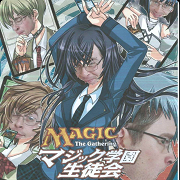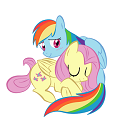|
A caveat to veekie's breakdown is that save-or-lose is potentially a very strong option under certain circumstances. Targeting a weak save of an enemy that's particularly difficult to take down in combat increases their value (which is why Will save-or-loses are more highly valued; they're a lot faster than chopping through a beefwall's HP). Low-level save-or-loses are more valuable, because at low levels the bonus of a high casting stat is larger compared to enemy saves (again, presuming a weak save). AoE save-or-loses are more valuable because, duh, they increase the potential payoff drastically. These factors are why Sleep and Color Spray are pretty boss at low levels despite the stuff veekie describes, and why Heavens oracles are terrifying at low-to-mid levels. Also, obviously a save-or-lose that doesn't cost the normal resources (either doesn't take a standard action or doesn't require a spell slot) is going to throw off the calculations, which is why witches' Slumber hex is awesome.
|
|
|
|

|
| # ? May 17, 2024 01:12 |
|
If you're a high level wizard and you're still relying on single-target spells that allow saving throws then you're honestly already gimping yourself. Save-or-dies own low-level play but as early as the mid levels you get the multi-target save-or-sucks like Stinking Cloud and even the lowly Slow, and the you-suck-and-get-no-save spells like Solid Fog and Sleet Storm. And that's not even getting into high level play, where you have a whole bouquet of spells that affect every enemy or allow no save. Whether it's efficient at killing enemies is irrelevant; the part that matters is that it's efficient at ending fights. The fighter can't turn a serious threat into a simple nonissue in a single round, and that's where, in play, the fighter will feel deficient. How badass does the fighter feel, really, when he spends four rounds in a row CDGing the orcs the wizard put to sleep? Not very, I'd wager. I've played a druid and a witch in PF games alongside paladins, rogues, fighters, and soulknives. I intentionally limited myself (refusing to use Wild Shape, or any good Hexes, for starters) and it worked okay. Everyone at the table knew that I was, on purpose, not getting the most out of my class, and I don't think, for the most part, that they cared. (Okay, so the soulknife did get a little peeved that my animal companion was better than his whole character in pretty much every way, and I had to stop calling my companion after awhile.) Gentleman's agreements are pretty much necessary for any PF game that gets into mid-to-high level, but they are a decent enough solution that the game is playable as long as your group agrees on one beforehand.
|
|
|
|
Evil Sagan posted:Well, I'm officially running Pathfinder this December. I'm both very excited and very terrified. Time to review the combat and encounter-building rules excessively. I have some advice for quick monster building. In the appendix of the Pathfinder bestiary there is a table with average stats for monsters by CR. There are a lot of times that I can't find a monster that fits the role I want at an appropriate CR for the party, so I'll just take the concept for the monster, use the average stats for the CR I want (with some tweaks depending on the role), and have a new monster built in a couple minutes. It's much faster than the traditional method of making monsters in 3.5/PF where you actually count up HD and ability scores and the like.
|
|
|
|
J. Alfred Prufrock posted:If you're a high level wizard and you're still relying on single-target spells that allow saving throws then you're honestly already gimping yourself. Save-or-dies own low-level play but as early as the mid levels you get the multi-target save-or-sucks like Stinking Cloud and even the lowly Slow, and the you-suck-and-get-no-save spells like Solid Fog and Sleet Storm. And that's not even getting into high level play, where you have a whole bouquet of spells that affect every enemy or allow no save. The important thing to note here is that Slow, Solid Fog, and Sleet Storm don't actually end fights. They debuff enemies significantly, they render them relatively nonthreatening, and then the fighter goes out and actually ends the fight. They fall into the same category as buffing the fighter for that reason. The line between "powerful debuff" and "save or lose" is a hazy one to be sure, and Stinking Cloud is definitely at the "save or lose" end of things, but the others you mention don't reach the point of "cast spell, start CdGing" where the fighter will almost inevitably start wondering why he's even there. (Also, Solid Fog and Sleet Storm are pretty boss at making enemies come at you in a trickle rather than a rush, but they also remove line of sight to the enemies in the cloud, so you'll still have to wait for them to stagger out one or two at a time to finish them. Just a note.)
|
|
|
|
High strength fighters using two-handed weapons and power attack are incredibly powerful. I've got a fifth level guy in one of my games hitting for 2d6+16 with +13 to hit. PLUS SIXTEEN. This is clearly the crazy mirror-land game, as it also features a Wizard* who is by far the weak-link in the party. *Illusionist
|
|
|
|
Mojo Jojo posted:High strength fighters using two-handed weapons and power attack are incredibly powerful. Different kinds of power. Fighter-types excel in dishing out damage per round, don't let all the complaints fool you. A well built fighter who gets out a full attack is likely to straight out end a level appropriate opponent(this is why archery builds are powerful by the way, they don't need to close to get full attacks). An attack buffed fighter is going to redefine pain for your enemies. However, they can't spread the pain around, and a beefcake enemy is going to survive the hits AND 1end the fighter right back in the same way. Being critically wounded doesn't affect the opponent. Casters excel at being able to do anything, if it can't be dealt with one way they have another way. Save or dies throws the fight into a lucky draw, one way you waste a slot, another way you beat the encounter. Battlefield control makes everything engage on your basis(which is the whole point of chess). Buffs amplify hard hitters. Summons changes the action balance. You don't need to be strong in every aspect. You just need to be strong at the aspect your opponent is vulnerable to and take a whack at them there.
|
|
|
|
That was less directed at the current and conversation and more a "thing I just realised about Pathfinder"
|
|
|
|
teddust posted:I have some advice for quick monster building. In the appendix of the Pathfinder bestiary there is a table with average stats for monsters by CR. There are a lot of times that I can't find a monster that fits the role I want at an appropriate CR for the party, so I'll just take the concept for the monster, use the average stats for the CR I want (with some tweaks depending on the role), and have a new monster built in a couple minutes. It's much faster than the traditional method of making monsters in 3.5/PF where you actually count up HD and ability scores and the like. Dang, this is solid. Thank you, teddust. You've saved me a ton of time.
|
|
|
|
Probably the most fun I ever had in 3.5 was my two-handed power attacking dervish with haste, recitation, sonic weapon, acid weapon crystal, flying with the +3 holy greatsword we'd stumbled on in the mod
|
|
|
|
Danhenge posted:Probably the most fun I ever had in 3.5 was my two-handed power attacking dervish with haste, recitation, sonic weapon, acid weapon crystal, flying with the +3 holy greatsword we'd stumbled on in the mod I got to use Tome of Battle in a short-lived campaign and made a Monk 6/Fighter 2/Swashbuckler 1/Reaping Mauler 1/Swordsage 1 with Shadow Blade (feat that lets you add dex bonus to damage with unarmed or light weapons). Let me full attack for +19/+19/+19/+14/+14 for 2d8+11+2d6 sneak attack PLUS bonus fire damage with Burning Blade. That guy was nearly able to keep up with Ferrinus's cleric who buffed himself with a bunch of 8-hour durations and attacked with a falchion.
|
|
|
|
It was a Favored Soul, a cleric would've been way stronger
|
|
|
|
At the time I was talking about we were also 11 and I think buffed my attack routine was +31/+31/+26/+21 for 7d6+27 (if they were evil - they mostly were), but I typically power attacking it down to +20/+20/+15/+10 for 7d6+47. Plus I was flying so I got to move 90 feet while full attacking.
|
|
|
|
J. Alfred Prufrock posted:The fighter can't turn a serious threat into a simple nonissue in a single round, Unless they get adjacent to an enemy and take out a third of its hit points, and threaten to do the same if it provokes an AoO. A well-build fighter, played with the same acumen as a wizard, is quite powerful. Fighters can't fly, dispel stuff, perform strong buffs, or cast save-or-dies, at least, not without gear. They can, however, do heavy damage (potentially close and at a range), lock down areas of the battlefield, engage multiple opponents at once, withstand powerful damaging attacks, and grapple effectively. For instance, a fighter can grab a dryad (CR 3) which is pretty much a fight-ender on par with what a wizard can do. Fighters have three basic weaknesses: they lack utilities (conceptually, they are probably going to under game system, although they may have niche protection in some other games they don't have in D&D/Pathfinder), they start to lose mathematical ground after about level 8 and become decidedly eclipsed after about 14 or so (depending), and past level 14 they do not enjoy the same action economy benefits as wizards.
|
|
|
|
pawsplay posted:Unless they get adjacent to an enemy and take out a third of its hit points, and threaten to do the same if it provokes an AoO. You forgot the fourth weakness: relies on doing hp damage. An enemy with 2/3 hp or 1/2 hp or 1/100000 hp still hits as hard as an enemy with full hp. Until you kill something, none of the damage you've done really affects the fight. It's pretty hard to balance that against spellcasters who can affect the field immediately. There are a few levels, though, where fighter (and rogue, if they can sneak attack) damage is high enough that it works out okay. That fairly narrow band could stand to be a bit broader, but it does exist. Benly posted:The important thing to note here is that Slow, Solid Fog, and Sleet Storm don't actually end fights. You know that point in a combat, where everyone is all "don't both wasting your spells/ki points/rage/items/whatever, we've got this in the bag" ? That's when the fight is over. Sure, the encounter will drag on for a few more rounds, but it's effectively ended. The best wizard spells effectively end fights, in the sense that they move the encounter straight from combat -> cleanup.
|
|
|
|
J. Alfred Prufrock posted:You forgot the fourth weakness: relies on doing hp damage. An enemy with 2/3 hp or 1/2 hp or 1/100000 hp still hits as hard as an enemy with full hp. Until you kill something, none of the damage you've done really affects the fight. It's pretty hard to balance that against spellcasters who can affect the field immediately. The same is true of an enemy who makes his save against a SoD, with the difference that an enemy who makes his save is no more or less likely to be switched to the other binary on/off state than he was against the previous one. quote:You know that point in a combat, where everyone is all "don't both wasting your spells/ki points/rage/items/whatever, we've got this in the bag" ? That's when the fight is over. Sure, the encounter will drag on for a few more rounds, but it's effectively ended. The best wizard spells effectively end fights, in the sense that they move the encounter straight from combat -> cleanup. Other than Stinking Cloud, none of the spells you mentioned do that. Solid Fog and Sleet Storm both block line of sight, which means there's not a whole lot you can do about the enemies you've delayed (other than throw AoE damage into their general area) until they make their way out and are no longer affected by it. Slow is pretty crippling against enemies with no ranged abilities or reach, assuming they all fail their saves and you have room to kite them. These spells are all great, but have fun "mopping up without wasting spells" after one of them without one or more frontliners.
|
|
|
|
J. Alfred Prufrock posted:You forgot the fourth weakness: relies on doing hp damage. An enemy with 2/3 hp or 1/2 hp or 1/100000 hp still hits as hard as an enemy with full hp. Until you kill something, none of the damage you've done really affects the fight. It's pretty hard to balance that against spellcasters who can affect the field immediately. Fighters can affect the field immediately, through interposition, as well as by mitigating damage to their allies, and by using combat maneuvers to debuff and contain their opponents. That is not their specialty, but that is something they can do. Also, hit point damage is a reliable way to defeat opponents in a way that save-or-die spells are not. If you are facing multiple moderately strong opponents, then casters can take them out with superior efficiency, but also deplete their resources. Against single opponents, however, casters who try to rely on SoD may end up trying to win the save lottery; the fight may well end with their spells having had almost no effect whatsoever.
|
|
|
|
pawsplay posted:Also, hit point damage is a reliable way to defeat opponents in a way that save-or-die spells are not. If you are facing multiple moderately strong opponents, then casters can take them out with superior efficiency, but also deplete their resources. Against single opponents, however, casters who try to rely on SoD may end up trying to win the save lottery; the fight may well end with their spells having had almost no effect whatsoever. This is true, and one of the few things they actually improved in Pathfinder: a lot of the old staple Save or Sucks like Hold Person and Glitterdust now allow saves every round to shake them off, which makes them much less reliable against big single targets. Of course, there's still always the chance to just shut down a dragon or whatever, but it's overall a better situation than it was in D&D at least. So I guess if you're GMing a fighter and a wizard, throw out lots of solos.
|
|
|
|
Nothing can really compete with the damage output of a competent physical damage-dealer (whether it's an optimized rogue, fighter, ranger, barbarian, etc). The problem with those physical classes is that they don't have much utility, so their chances to apply their insane damage combo is low against a competent opponent. But when the fighter gets his opponent where he wants him, odds are good that he can kill the enemy in one round. And typically he isn't burning limited resources to do that. And likewise, a spellcaster doing direct damage is the least efficient use of their spells. If you want to call it action economy, the fighter is generating value for the party every round he's winning combat, since his abilities don't cost anything to use. A wizard is spending value every round he's casting spells. I look at party-based combat like this: the fighters are the backbone of the combat machine, and it's the wizard's job to funnel the enemies into that backbone at the proper rate to keep the fighter doing his gimmick at maximum efficiency. Sometimes that's making sure flying spellcasters stay in reach, sometimes it's protecting the close combatants from the enemy's gimmick attacks, and sometimes it's separating the enemies so they can be focus-fired down one at a time. If you're fighting a bunch of bears, then mass fly trivializes the fight and lets the fighters pick them off at leisure. A wizard going nova can probably end the fight on his own also, but then he's vulnerable until he rests. A good wizard can just spend a few of his limited resources on each fight, and keep enough in reserve to get the party out of a really bad situation. If you play it this way, the wizard isn't metagaming to "let the other members shine," he's legitimately holding power in reserve in case something really powerful shows up that only he has a chance of stopping.
|
|
|
|
Infinite Karma posted:Nothing can really compete with the damage output of a competent physical damage-dealer (whether it's an optimized rogue, fighter, ranger, barbarian, etc). The problem with those physical classes is that they don't have much utility, so their chances to apply their insane damage combo is low against a competent opponent. But when the fighter gets his opponent where he wants him, odds are good that he can kill the enemy in one round. And typically he isn't burning limited resources to do that. And likewise, a spellcaster doing direct damage is the least efficient use of their spells. If you want to call it action economy, the fighter is generating value for the party every round he's winning combat, since his abilities don't cost anything to use. A wizard is spending value every round he's casting spells. This is always how my D&D games have gone. Fighters do the fighting, wizards generally use their spells for the weird things, finding poo poo out, saving their spells for the bossfights or when things go totally wrong. They have limited charges so they make sure not to waste them on things other characters can do (kill things) without spending resources.
|
|
|
|
So, it would appear that there is now a roc available as an animal companion. As a medium creature, it lets small druids start with a flying mount. Is it just me, or is a flying mount a little bit over the top for a first level character? Flight is always a pain, and non-magical flight from the off just seems gratuitous.
|
|
|
|
We noticed this last night during some downtime in our game:quote:A minor ring of spell storing contains up to three levels of spells (either divine or arcane, or even a mix of both spell types) that the wearer can cast. Each spell has a caster level equal to the minimum level needed to cast that spell. The user need not provide any material components or focus to cast the spell, and there is no arcane spell failure chance for wearing armor (because the ring wearer need not gesture). The activation time for the ring is the same as the casting time for the relevant spell, with a minimum of 1 standard action. Unless we're reading this incorrectly there's no provision for the spell being expended. That makes the Major Ring of Spell Storing a Ring of Infinite Wishes. Obviously a good DM would just stomp on this, but it seems like a big oversight.
|
|
|
|
LongDarkNight posted:We noticed this last night during some downtime in our game: It wouldn't be infinite, each time you cast the spells within the ring they are expended. In the DM guide (at least in the 3.5 version), there is an example where a wizard casts 3 spells into the ring, a druid uses one then replaces it with another spell (bringing the total back up to 3), then gives a barbarian the ring. The benefit of the ring is that the spell can be used later by anyone without armor checks or any other bullshit. So a caster could use it to boost spells/day or give it to a fighter or whatever to cast spells. Where did you read this? It might have been errata'd or clarified in 3.5, the example was right before the "ring magically imparts name of spells" sentence in my book.
|
|
|
|
I actually checked the d20srd and its' got that wording as well. Obviously rule zero applies.
|
|
|
|
If you want to be even nitpickier, it doesn't actually grant the ability to cast the spells. It says it "contains up to three levels of spells that the wearer can cast", which can equally well be read as a restriction on what spells the ring can contain such that the ring loses the ability to contain any spell the wearer does not have the ability to cast. This would still be a pretty powerful ring, since it removes the need for material and somatic components for that one spell.
|
|
|
|
LongDarkNight posted:We noticed this last night during some downtime in our game: You are reading it incorrectly. The item says everything it does, and what it says is: quote:A minor ring of spell storing contains up to three levels of spells (either divine or arcane, or even a mix of both spell types) that the wearer can cast. Unless there is some qualifier in the description I'm missing, that pretty clearly means three levels ever. Cast a third level spell? You have cast three levels of spells. Those are the spell levels that were "stored." The end. If it meant "cast spells repeatedly that total three levels of spells" it would have been written that way.
|
|
|
|
So I'm trying to figure out what the role of death is in this game. I was asking a more experienced DM if, when designing an adventure site, I should include encounters that are meant to be avoided (unwinnable in straight combat). When she told me that most players won't really infer that a combat encounter isn't meant to be beaten, I easily accepted that. This is a game with plenty of combat rules that are meant to be played out. There's clearly a tactical aspect. But when the conversation continued, she began to assert that I should actually avoid killing the players altogether. Like, if I were to design a reasonably challenging encounter, but the players walked into it without resting after five other encounters or the players just weren't playing it very smart, it's my responsibility to alter the scenario so that the players don't die. For me, personally, this didn't sit very well. I imagined that if I were playing, I'd be rather miffed to find out that my victory is inevitable. But to ask this DM, you'd think the rules are not there to enhance the "play pretend" experience, but merely to obfuscate it, as if the whole thing is an elaborate illusion making the players think anything dynamic is happening at all.
|
|
|
|
She's partially correct, players have a mentality that as "PCs" the world exists for them and that they never have to retreat from encounters. The game is supposed to be fun for everyone involved. You can try to set expectations at the start of the campaign, but you will need to strike a balance between murdering them wholesale and pulling your punches. I usually just kill one player early on to send a message.
|
|
|
|
Evil Sagan posted:But to ask this DM, you'd think the rules are not there to enhance the "play pretend" experience, but merely to obfuscate it, as if the whole thing is an elaborate illusion making the players think anything dynamic is happening at all. I don't see a problem with this. Players don't say "remember the time we almost killed the Godking Conqueror and saved the realm, but then I rolled a one and died?". They say, "remember the time I decapitated the Godking with his own divine sword and held his head up so that everyone would see while his tower crumbled around us?" The story is always about the players, and as a GM it's your job to give second, third, and fourth chances where appropriate. Make the players feel heroic. Make sure their convoluted schemes work. Make fatal blows into near misses. Fudge the dice. Lie to your players. They'll enjoy it more. For an anecdote, one DM went on a killing spree some weeks back, where multiple PCs were dying every session. It got to the point where we'd come with a stack of characters, none of which were named or were very generic(alpha, beta, etc.). That wasn't fun. There was no time to get attached to the characters or develop an interesting story. By the time we killed the BBEG we'd gone through an easy 10+ party members, none of the original group was left alive, and none of us had any reason to feel like we'd accomplished anything. That's probably a little extreme for your campaign, but just be aware that your players get attached to their characters. And they should! They're heroes! Heroes should have heroic deaths, meaningful and with a lasting impression. They shouldn't die at the bottom of a pit or laying on a dirty dungeon floor 3 miles underground.
|
|
|
|
Also there are ways to make the PCs lose without killing them. "Oh poo poo, you're all captured and sold into slavery! Enjoy escaping the salt mines!" or "Holy crap! That village full of NPCs you all liked? Burned to the ground and everyone massacred." or "Goddamn, I need a calculator to tally up the number of innocent lives that have been lost due to your failure." or "The goblins drag you back to their camp. They've got a big pot set to boiling and are currently sprinkling you with salt and spices. What do you do?" These are interesting scenes that can test both the characters and the players, and really, forcing the players to deal with the consequences of their failure is actually a better punishment than just making them roll new characters.
|
|
|
|
Evil Sagan posted:So I'm trying to figure out what the role of death is in this game. I was asking a more experienced DM if, when designing an adventure site, I should include encounters that are meant to be avoided (unwinnable in straight combat). My personal take is: fudging is fine to give the players a chance to survive. The "walk into it without resting" scenario you describe actually happened in a fairly recent session of the campaign I'm running (2E module adapted to PF). After a fairly long run without stopping to rest, the PCs managed to blunder into one of the module's tougher encounters (one of these; the PCs are level 6 and were short on spells and this thing is a fairly badass CR 8) and decided, unwisely, to fight. I made clear with the descriptions that they were not doing well, and after a PC went from full health to unconscious in one claw-claw-bite they got the message that loving-around time was over. They hauled rear end, managed to get away, recovered, and when they went after it again later they managed to win - after the now-warned creature had sprung an ambush on them. Given its capabilities, it would have been possible for it to render escape impossible (good luck fleeing through twisty corridors from something faster than you, with better knowledge of the terrain, that can cast Grease) but they came up with a fairly decent escape plan and frankly, "we ran like our asses were on fire and came back for a second try later" is more fun and makes a better story than "we fell over ourselves on grease and were entirely dismantled while helpless by a creature that the module doesn't give forewarning about".
|
|
|
|
J. Alfred Prufrock posted:Also there are ways to make the PCs lose without killing them. "Oh poo poo, you're all captured and sold into slavery! Enjoy escaping the salt mines!" or "Holy crap! That village full of NPCs you all liked? Burned to the ground and everyone massacred." or "Goddamn, I need a calculator to tally up the number of innocent lives that have been lost due to your failure." or "The goblins drag you back to their camp. They've got a big pot set to boiling and are currently sprinkling you with salt and spices. What do you do?" Indeed. Unless the death is literally the least interesting consequence in D&D. It counter-intuitive, because death in the real world is a very power fear. In D&D it just means the story of the character is over with no real bookend. The exception being if the character's death is some noble sacrifice, or some MAJOR story arc. It does matter what kind of game you're playing though. If the expectation is a hardcore dungeon crawl, light on story, don't fudge the dice, and let people die where they may. The emphasis in these games is the combat, and fudging this can lead to a feeling that the combat isn't important, which leads to "so what the hell are we doing". One could argue that you shouldn't fudge dice. The argument is if you are fudging dice, then you've subtly DM fiated that the PCs were meant to win the fight. If the outcome is determined, why are you rolling dice. Move on to things that aren't determined and are interesting. If you find your in an situation where you had to fudge the dice so the namless kobold doesn't crit and kill the PC, shouldn't you ask yourself "Why are my PCs fighting nameless kobolds?"
|
|
|
|
I really appreciate all your thoughts on this. Ulta hit the nail on the head, pointing out how I feel about the inevitable victory, but I do see the wisdom in not ruining the night, or weeks of effort, through a series of bad combat decisions on their part. It seems safe to say that TPK is completely out. And hell, that's fine. Obviously it's not my will to kill the characters. Simply to make the danger real to them. If a more subtle method is necessary to keep things fun, then so be it. I'm considering asking my players how they feel about the notion of death in D&D. I'm concerned, though, if they say they recognize death as a legitimate outcome, that they might later come to believe that I thought they were explicitly inviting me to kill them. I guess I'm rambling at this point. It seems painfully clear that death is not always, and probably rarely, the correct consequence.
|
|
|
|
Magic Rabbit Hat posted:The story is always about the players, and as a GM it's your job to give second, third, and fourth chances where appropriate. Make the players feel heroic. Make sure their convoluted schemes work. Make fatal blows into near misses. Fudge the dice. Lie to your players. They'll enjoy it more. I hope someone you love turns out to have been "fudging" it all along so you can viscerally experience what a horrible opinion you posted right here.
|
|
|
|
Evil Sagan posted:I really appreciate all your thoughts on this. Ulta hit the nail on the head, pointing out how I feel about the inevitable victory, but I do see the wisdom in not ruining the night, or weeks of effort, through a series of bad combat decisions on their part. I like to give PCs plenty of escapes, provided they have the good sense to take them. That said, I will totally kill a PC, especially early in the campaign. Sometimes that's what it takes to prevent a TPK later. It keeps the fear real, which I think is important for the spirit of an adventure. I haven't fudged a roll in 25 years. I like to think the unexpected is what keeps things interesting. Despite that, my games are not particularly deadly compared to most. In my 1st to 20th level campaign, we had one false start at the beginning in which several PCs died to ghouls, but after that, we had only two more exits by death from the campaign, compared to four player rotations and two PC retirements. In general, I caution people about talking RPG stories as though they were novels or movies. The fiction of an RPG is more like improv theater, or a gameshow, or (for that matter) a wargame. There are certainly approaches that remove physical danger and death as the main challenge, but I'm not sure Pathfinder is the best system to play that kind of campaign. Magic Rabbit Hat posted:Players don't say "remember the time we almost killed the Godking Conqueror and saved the realm, but then I rolled a one and died?". They say, "remember the time I decapitated the Godking with his own divine sword and held his head up so that everyone would see while his tower crumbled around us?" In my experience they say both. quote:The story is always about the players, and as a GM it's your job to give second, third, and fourth chances where appropriate. Make the players feel heroic. Make sure their convoluted schemes work. Make fatal blows into near misses. Fudge the dice. Lie to your players. They'll enjoy it more. I won't say this is wrong, but I will say that any time I've ever gotten a whiff a GM was running a campaign this way, I lost interest. I don't want to be lied to; it's hard enough just knowing that's all pretend. quote:For an anecdote, one DM went on a killing spree some weeks back, where multiple PCs were dying every session. It got to the point where we'd come with a stack of characters, none of which were named or were very generic(alpha, beta, etc.). That wasn't fun. That does sound pretty bad. pawsplay fucked around with this message at 22:10 on Sep 18, 2011 |
|
|
|
Riidi WW posted:I hope someone you love turns out to have been "fudging" it all along so you can viscerally experience what a horrible opinion you posted right here. To be fair, this would be a good approach if you played only with three year olds of average maturity.
|
|
|
|
Magic Rabbit Hat posted:The story is always about the players, and as a GM it's your job to give second, third, and fourth chances where appropriate. Make the players feel heroic. Make sure their convoluted schemes work. Make fatal blows into near misses. Fudge the dice. Lie to your players. They'll enjoy it more. I know everyone has pretty much already told you they think that's an awful way to run a game but just adding a plus one to that. Why even roll dice or have character sheets if that is what you want to do? I'm not saying this in a groggy "you're doing it wrong" way but, honestly, if that is how your group wants to play then why waste time with the charade of a crunchy rules system?
|
|
|
|
The important keyword is "where appropriate". My basic rule is "will this death make a good story later?" If yes ("half of us lost our lives battling the Worldworm - we shall mourn them in song!") go for it. If no ("Both gnolls crit for max damage. You take.. hey, how many HP do you have, anyway?") then I feel free to fudge to keep things fun.
|
|
|
|
Karandras posted:I know everyone has pretty much already told you they think that's an awful way to run a game but just adding a plus one to that. Because it's fun. The character sheets and dice are there for the player's sake, not mine. I'll shuffle the papers and ho and hum about this or that, but behind the DM screen I'm rubbing my fingers together and thinking about how I'm going to make this the most awesome session yet. Sometimes I just ignore the rules whenever the situation calls for it and hide it behind a superfluous dice roll. Not to say that everything the players do succeeds outright, but for the most part I let them do what they want, and they seem to really enjoy the wacky hijinx. Magic Rabbit Hat fucked around with this message at 02:40 on Sep 19, 2011 |
|
|
|
Karandras posted:I know everyone has pretty much already told you they think that's an awful way to run a game but just adding a plus one to that. Or "Opps, the whole party rolled 1s and 2s against a routine bandit encounter's Color Spray". When the players SEEK out a known hazard, then it is dramatically appropriate to let the dice fall where they will. When its inappropriate, adjust the situation and scale back the challenge where possible. Maybe the monster was so strong because it ate some super steroid grass and that poo poo wears off in a round. Its fine to use it. It's not fine to rely on it.
|
|
|
|

|
| # ? May 17, 2024 01:12 |
|
Benly posted:The important keyword is "where appropriate". My basic rule is "will this death make a good story later?" If yes ("half of us lost our lives battling the Worldworm - we shall mourn them in song!") go for it. If no ("Both gnolls crit for max damage. You take.. hey, how many HP do you have, anyway?") then I feel free to fudge to keep things fun. I think in the second scenario, I would still prefer an above-board GM fiat. "Uh, your hit points are at -1, and your left hand is severed." I really believe honesty is the best policy. If I were to employ such a technique, I would want to makes a clear distinction between exerting GM discretion as a practical campaign issue (dead PCs aren't much fun) versus playing with bumper pads. Ideally, I'd want to run my campaign in such a way that random, casual deaths just don't happen often enough to disrupt campaign continuity, but I can understand that there are times when it would just be a pain in the rear to roll up a new PC or two because of carelessly placed, unimportant gnolls of unexpected might.
|
|
|






















